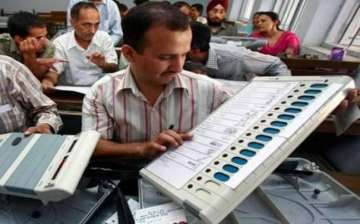Ahead of the 2019 parliamentary elections, the Ministry of Environment, Forests and Climate Change (MoEFCC) has asked all states and union territories (UTs) not to use single-use plastic for poll preparations and to encourage use of alternative materials for election campaign.
The ministry also laid down standard guidelines to be adopted for minimising production and use of single-use plastic.
C K Mishra, Secretary, MoEFCC, has written to all the states and UTs reiterating that single-use plastics need to be completely phased out from the country by 2020 so they should switch to alternate options for election campaign.
"You are aware about India's commitment to phase out single-use plastic by 2020. The ill-impacts of plastic waste, which are not recyclable or bio-degradable, are well known. I had earlier written to you with a request to phase out single-use plastic in offices. I am again reiterating the request, particularly with reference to the upcoming general elections," Mishra said in his letter.
Catch all the latest news about Lok Sabha elections 2019 HERE
The secretary, in his letter to the chief secretaries and chief electoral officers of all the states and UTs on Monday, said all government offices must completely ban all types of plastic carry bags, thermocol disposable cutlery and discourage the use of artificial banners, flags, flowers, water bottles, plastic folders, etc.
"All events organised by or sponsored by the government shall be single-use plastic free," he said, adding that awareness campaigns should be organised to discourage single-use plastic.
Single-use plastic is often referred to as disposable plastics, commonly used for packaging and items intended to be used only once before they are thrown away.
The ministry suggested alternative options to plastic in campaigning material such as natural fabrics and recycled paper material which have a lesser environmental impact.
"Such materials need to be promoted as a sustainable and environmentally sound management practice. The upcoming general elections present an excellent opportunity to introduce a behavioural change in election campaigning and to promote sustainable practices.
"In this background, I would like to request you to impress upon all concerned to take up sustainable practices and try using alternative options to single-use plastic. This will go a long way in fulfilling India's commitment of phasing out single-use plastic as well as protecting human health and environment," he said.
The ministry has laid down standard guidelines to be followed by the states and UTs regarding single-use plastics to avoid ambiguity and maintain parity among action at state-level.
"I invite you to adopt these guidelines in your state/UT and hope that actions suggested therein would be useful for effective management of plastic waste in your state/UT. We would also urge the states/UTs to come up with innovative ideas to minimise single-use plastic and improve upon these guidelines in their states," Mishra said.
Expressing concern over the rise in the amount of plastic entering oceans and seas, the secretary said marine litter is harmful for marine ecosystem, bio-diversity and potentially human health and there was need for a strategic approach to manage plastic waste.
Under the Plastic Waste Management Rules (PWMR) 2016 notified by the ministry to manage plastic in an environmentally sound manner throughout their life cycle, 15 states and four union territories have issued notifications completely banning plastic carry bags and single-use plastic items like food packaging, cutlery etc., the ministry said.
The ministry also suggested the states to invest heavily in segregation of waste.
"States/UTs may focus on improving last mile delivery of collection and transportation services. The focus should also be placed on improving collection and transportation infrastructure and ensuring segregated waste is collected," it said.
